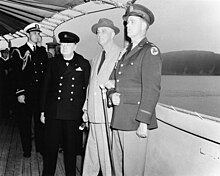The term "new world order" refers to a new period of history evidencing dramatic change in world political thought and thebalance of power in international relations. Despite varied interpretations of this term, it is commonly associated with the notion ofworld governance.
The phrase "new world order" or similar language was used in the period toward the end of theFirst World Warin relation toWoodrow Wilson's vision for international peace;[a]Wilson called for aLeague of Nationsto prevent aggression and conflict. In some instances whenFranklin D. Rooseveltused the phrase "new world order", or "new order in the world" it was to refer toAxis powersplans for world domination.[1][2][3][4]Although Roosevelt andHarry S. Trumanmay have been hesitant to use the phrase,[citation needed]commentators have applied the term retroactively to the order put in place by the World War II victors including theUnited Nationsand theBretton Woods systemas a "new world order."[5][6]
The most widely discussed application of the phrase of recent times came at the end of theCold War. PresidentsMikhail GorbachevandGeorge H. W. Bushused the term to try to define the nature of thepost-Cold War eraand the spirit ofgreat powercooperation that they hoped might materialize. Gorbachev's initial formulation was wide-ranging andidealistic, but his ability to press for it was severely limited by theinternal crisis of the Soviet system. In comparison, Bush's vision was not less circumscribed: "A hundred generations have searched for this elusive path to peace, while a thousand wars raged across the span of human endeavor. Today that new world is struggling to be born, a world quite different from the one we've known".[7]However, given the newunipolarstatus of the United States, Bush's vision was realistic in saying that "there is no substitute for American leadership".[7]TheGulf Warof 1991 was regarded as the first test of the new world order: "Now, we can see a new world coming into view. A world in which there is the very real prospect of a new world order. ... The Gulf War put this new world to its first test".[8][9]
Historical usage[edit]
 Woodrow Wilson
Woodrow Wilsonand the Origin of the
League of NationsThe phrase "new world order" was explicitly used in connection withWoodrow Wilson's global zeitgeist during the period just after World War I during the formation of theLeague of Nations. "The war to end all wars" had been a powerful catalyst in international politics, and many felt the world could simply no longer operate as it once had. World War I had been justified not only in terms of U.S.national interest, but in moral terms—to "make the world safe for democracy". After the war, Wilson argued for a new world order which transcended traditional great power politics, instead emphasizing collective security, democracy and self-determination. However, theUnited States Senaterejected membership of the League of Nations, which Wilson believed to be the key to a new world order. SenatorHenry Cabot Lodgeargued that American policy should be based on human nature "as it is, not as it ought to be".[10]Naziactivist and future German leaderAdolf Hitleralso used the term in 1928.[11][failed verification]
 Franklin D. Roosevelt
Franklin D. Rooseveltand
Winston Churchillduring the meeting that would result in the
Atlantic Charter, precursor to the
Bretton Woods systemThe term fell from use when it became clear the League was not living up to expectations and as a consequence was used very little during the formation of the United Nations. FormerUnited Nations Secretary GeneralKurt Waldheimfelt that this new world order was a projection of theAmerican dreaminto Europe and that in its naïveté the idea of a new order had been used to further the parochial interests ofLloyd GeorgeandGeorges Clemenceau, thus ensuring the League's eventual failure.[12]Although some have claimed the phrase was not used at all,Virginia Gildersleeve, the sole female delegate to the San Francisco Conference in April 1945, did use it in an interview withThe New York Times.[citation needed]
The phrase was used by some in retrospect when assessing the creation of the post-World War IIset of international institutions, including theUnited Nations; the U.S. security alliances such asNATO; theBretton Woods systemof theInternational Monetary Fundand theInternational Bank for Reconstruction and Development; and even theTruman DoctrineandMarshall Planwere seen as characterizing or comprising this new order.[citation needed]
H. G. Wellswrote a book published in 1940 entitledThe New World Order. It addressed the ideal of a world without war in which law and order emanated from aworld governingbody and examined various proposals and ideas.
Franklin D. Rooseveltin his "Armistice Day Address Before the Tomb of the Unknown Soldier" on November 11, 1940, referred toNovus ordo seclorum, inscribed on theGreat Seal of the United Statesand traced to antiquity. By this phrase,Virgilannounced the Augustan Golden Age. That Age was the dawn of the divineuniversal monarchy, but Roosevelt on that occasion promised to take the world order into the opposite democratic direction led by the United States and Britain.[13]
On June 6, 1966, New York SenatorRobert F. Kennedyused the phrase "new world society" in hisDay of Affirmation AddressinSouth Africa.[14]
Post-Cold War usage[edit]
The phrase "new world order" as used to herald in the post-Cold War era had no developed or substantive definition. There appear to have been three distinct periods in which it was progressively redefined, first by the Soviets and later by the United States before the Malta Conference and again afterGeorge H. W. Bush's speech of September 11, 1990.
- At first, the new world order dealt almost exclusively withnuclear disarmamentand security arrangements.Mikhail Gorbachevwould then expand the phrase to includeUnited Nationsstrengthening andgreat powercooperation on a range ofNorth–Southeconomic, and security problems. Implications forNATO, theWarsaw Pact, andEuropean integrationwere subsequently included.
- TheMalta Conferencecollected these various expectations and they were fleshed out in more detail by the press.German reunification,human rightsand thepolarityof theinternational systemwere then included.
- TheGulf Warcrisis refocused the term onsuperpowercooperation and regional crises. Economic North–South problems, the integration of the Soviets into the international system and the changes in economic and military polarity received greater attention.









